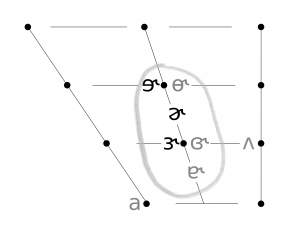26 The lettER Lexical Set
 The letter lexical set is a part of the group of Weak vowels that are only found in unstressed syllables, and in all cases it is spelled with ‹r›. In most rhotic varieties of English today, letter is an r-colored mid-central vowel, right in the middle of the vowel space known as rhotic schwa, /ɚ/. In non-rhotic accents of English, letter is merged with the comma lexical set, so there is no /r/ sound associated except when linking into another word, or a suffix, that begins with a vowel, as in the letter ͜ is, or lettering. Wells focused his weak vowel lexical sets (comma, letter, happy) on the environment of the final weak vowel of words like media, after, privacy. However, many linguists and accent trainers use these lexical set keywords in initial and medial (i.e. non-final) environments, too.
The letter lexical set is a part of the group of Weak vowels that are only found in unstressed syllables, and in all cases it is spelled with ‹r›. In most rhotic varieties of English today, letter is an r-colored mid-central vowel, right in the middle of the vowel space known as rhotic schwa, /ɚ/. In non-rhotic accents of English, letter is merged with the comma lexical set, so there is no /r/ sound associated except when linking into another word, or a suffix, that begins with a vowel, as in the letter ͜ is, or lettering. Wells focused his weak vowel lexical sets (comma, letter, happy) on the environment of the final weak vowel of words like media, after, privacy. However, many linguists and accent trainers use these lexical set keywords in initial and medial (i.e. non-final) environments, too.
- 🕊 Free: apart from ‹r›, letter does not require a following consonant.
 Weak: in unstressed syllables only. (For the stressed version, see nurse.)
Weak: in unstressed syllables only. (For the stressed version, see nurse.)
Spellings
-er, -ar, -or, -o(u)r, -yr, -ure, -ir, -air, -Cre
As originally conceived by Wells, where letter is in final position, there are many spellings: essentially any vowel letter before ‹r› as in stellar, better, elixir, actor, sulfur, zephyr or before ‹re› as in metre, culture. In initial settings, there are almost no words whatsoever, apart from urbane and Urbana; in a rhotic accent, if you are dealing with a Weak Vowel merger, initial ‹er› as in erode, erase, erupt is also possible. In rhotic accents, in medial settings all the vowel letters are options, ‹er›, ‹ar›, ‹or›, ‹ur›, as in terrain, marine, memories, luxury, and even ‹ir› and ‹yr›, as in inspiration and labyrinth. In non-rhotic accents, these last two are Weak kit, [ɪ], unless there is the Weak Vowel merger, in which case all spellings can be comma/letter.
Spellings include: accelerate, restaurant, amateur, cedar, cover, anchor, endeavo(u)r, anger, pursue, nature, acre
Pronunciations
In the vast majority of mainstream accents of English, the letter lexical set is pronounced with some variation of either the non-rhotic schwa [ə] or the rhotic one [ɚ]. However, there is a limited range of alternate pronunciations, ranging from a high/close pronunciation with [ɘ/ɘ˞], to a more open centralized vowel closer to [ɜ/ɝ ~ ɐ/ɐ˞].
Personal Pronunciation
This is the moment where we focus in on how you say letter. If you have a non-rhotic accent, you will mostly likely have letter merged with comma: compare vesper/Vespa, tuber/tuba, pastor/pasta, pander/panda. If letter is merged with comma, be sure to review that set’s Personal Pronunciation section before moving on to Alternate Pronunciations.
Note that for many rhotic speakers, the vowel quality of letter is similar or even identical to nurse, though it is weak, always found in unstressed syllables. In the past the symbols [ɚ/ɝ] or [ə/ɜ] were seen as being identical in terms of vowel quality, and different only in terms of stress, upholding the statement that “schwa is never stressed.” Today, many teachers/coaches differentiate between the two symbols as different vowel qualities, and that either can be stressed or unstressed. Be sure to read the nurse Personal Pronunciation section before proceeding with letter.
 For people whose letter isn’t merged with comma, let’s take care to figure out where this vowel lies. Mid-central vowels, rhotic or not, are the “grey area” of the vowel space, and the difference between one vowel quality and the next may be difficult to detect. You may find it to be easier to hear what you’re doing with unstressed syllables by recording your voice saying some words from the lists below, and then slowing the audio down in software (like the free app Audacity, which can allow you to slow the track using “Change Tempo…” from the Effect Menu). You could also experiment on your own or with a classmate, friend, coach or teacher to identify how your letter vowel compares with others. Without adding any stress or emphasis to the syllable, try lengthening the sound of your letter vowel, and try to lock on to its sound, and the physical actions you’re doing to shape the sound with your articulators. Once you feel clear as to its quality, then attempt to subtly shift it around from its normal, everyday space in the middle of your personal vowel space—up, forwards, down, and back—in tiny increments. You should feel the top surface of your tongue moving towards/away from middle of your mouth. What’s the smallest noticeable change that you can make?
For people whose letter isn’t merged with comma, let’s take care to figure out where this vowel lies. Mid-central vowels, rhotic or not, are the “grey area” of the vowel space, and the difference between one vowel quality and the next may be difficult to detect. You may find it to be easier to hear what you’re doing with unstressed syllables by recording your voice saying some words from the lists below, and then slowing the audio down in software (like the free app Audacity, which can allow you to slow the track using “Change Tempo…” from the Effect Menu). You could also experiment on your own or with a classmate, friend, coach or teacher to identify how your letter vowel compares with others. Without adding any stress or emphasis to the syllable, try lengthening the sound of your letter vowel, and try to lock on to its sound, and the physical actions you’re doing to shape the sound with your articulators. Once you feel clear as to its quality, then attempt to subtly shift it around from its normal, everyday space in the middle of your personal vowel space—up, forwards, down, and back—in tiny increments. You should feel the top surface of your tongue moving towards/away from middle of your mouth. What’s the smallest noticeable change that you can make?
Using whatever IPA symbol best represents where you’re feeling letter, use the following diacritical marks to adjust the symbol to more accurately match your sound. If your letter vowel is
- high, use the raised diacritic [ ɚ̝ ], a small T pointing up
- open, use the lowered diacritic [ ɚ̞ ], a small T pointing down
- pushed forward, use the advanced diacritic [ ɚ̟ ], a tiny plus sign +
- pulled back, use the retracted diacritic [ ɚ̠ ], a tiny minus sign –
- if you add lip-rounding, use the more rounded diacritic [ ɚ̹ ], a tiny ɔ, which represents the lips rounding forward (to the left).
Alternate Pronunciations
Experiment with the Word Lists, Phrases and Sentences with the following Rhotic vowels:
Rhoticity Scale: Now that you’ve explored vowel quality, let’s think about how much r-coloring, or rhoticity, you’ve been adding. How rhotic can you make letter? How little rhoticity can you add without it having none? Can you make several shades of r-coloring: none, a tiny bit, a little, some, quite a lot, a ton? Think of it as a scale from 0–5. Where does yours sit? You would transcribe a specific vowel, with a rhoticity “wing” diacritic, as you see above. You could use multiple wings [ɚ˞˞], but this can be hard to read.
For my own usage, I’ve tried adding a superscript number after a rhotic diacritic to rank the r-ishness on that 0-5 scale, with 0 being none and 5 as much as you can, e.g. [ɘ˞3] for a medium amount of r-quality.
Also experiment with non-rhotic variations for letter:
As you move the vowels in the directions recommended, see whether that modified oral posture might inspire you to move the articulation of consonants and other vowels in the word in similar ways. Does it remind you of another accent?
Word Lists for letter, in Initial, Medial, and Final Settings
KEY: ![]() letter in initial position,
letter in initial position, ![]() letter in medial position,
letter in medial position, ![]() letter in final position
letter in final position
PLOSIVES
-p
-b
-t
-d
-k
-ɡ
AFFRICATES
-tʃ
-dʒ
NASALS
-m
-n
-ŋ
FRICATIVES
-θ
-ð
-f
-v
-s
-z
-ʃ
-ʒ
-ɹ*
All these words may be said with comma before /r/ in non-rhotic accents
-l/ɫ
w
j
- Better, stronger, faster.
- Future conservative leader.
- A safer internet browser.
- Jagger perfected his performance.
- Liverpool’s manager loves their supporters.
- Richard ordered water.
- Jennifer is a junior in university.
- The surfer’s trainer is from overseas.
- Henderson is an energetic soccer player.
- Bermuda’s weather features a southerly breeze.
- Patterns of consumer behavio(u)r.
- My grandmother’s wringer washer.
- What percentage did the teacher give the actor?
- A number of her lover’s undershirts.
- My tailor took her scissors to my blazer.

Sentences
Level 1
Short with 3-4 words, underlined
- The golfer made a safer choice with her new putter.
- Tamera liked thrillers, not horror movies.
- Sanders wasn’t the winner of the popular vote.
- He used a laser from the gallery of the theatre.
- Cover your fingers with Purell hand sanitizer.
Level 2
Short with 5-6 words, underlined
- I gather Heather would rather do the weather than be a traffic reporter.
- For your information, the interviewer put the author through the wringer.
- The hunter from Vermont worked as an expert fisherman in the summer.
- My mother never liked watermelon or cucumber: they made her burp!
- Bakers Robert and Parker were co-workers till October.
Level 3
Medium with 3-4 words, not underlined
- Virginia the photographer took a picture of the tiger.
- Perdita told Pongo it was too dangerous for her children.
- Remember that an officer’s leadership duties are high-pressure.
- The SS Nerissa was a passenger steamer that was sunk by a submarine.
- The minister from Windsor suffered during their cancer treatment.
Level 4
Hard with 4-6 words, not underlined
- Riverside Manor Seniors Center overlooks the harbo(u)r.
- Marina studied acupressure properly, at a variety of training centers.
- Is your professor is a more skilled teacher than administrator or researcher?
- A scalar is just a number that makes the vector bigger (or smaller).
- Afterwards, the repairer will properly separate the smaller trailer’s fenders from the frame.
Mergers
comma-letter Merger: In non-rhotic accents, comma and letter are merged, and both pronounced with some variant of schwa. This is perhaps one of the most common mergers in English. Minimal Pairs when merged are sometimes non-obvious: tuba/tuber, data*/date’er, Lida/leader, PETA/Peter, Silva/silver, Korea/career, Russia/rusher, Donna/Donner, on a/hono(u)r. Below are sentences with comma and letter.
-
- My father left China to start a better career as a miner in Korea.
- Anna had good manners and always helps customers when they have a dilemma.
- Georgia felt major nostalgia when watching old war and soldier movies.
Schwa Deletion, aka Syncope: when the letter (or comma) vowel is deleted in the middle of a word. Primarily heard in Canadian and US accents, it occurs much more frequently after a stressed syllable, as in desp(e)rate, mem(o)ry, than before, c(a)reer, c(o)rrect. It has been shown to happen more frequently in certain contexts, and is more likely to happen in high frequency words (that we hear often, and can therefore easily predict), than in low frequency words (which are more rare, and thus harder to predict.) This means frequently occurring words like av(e)rage, diff(e)rance are more likely to be heard than less frequent words like hum(o)rous, lux(u)ry[1].
Vowel Reduction/Deletion in 2-Syllable Suffixes: In words of 3+ syllables with suffixes with two syllables, -ary, -ory, -ony, -orough/-oro/-urgh, -berry, -bury, in accents of Britain, and the southern hemisphere, the strong vowels heard in North America (the older form) are reduced to schwa or deleted all together.
| Examples: | RP | GenAm |
| contemporary | [kn̩ˈtɛmpɹəɹi] | [kn̩ˈtɛmpɚɹɛɚ̯i] |
| category | [ˈkætəɡəɹi] | [ˈkætəɡɔɚi] |
| ceremony | [ˈsɛɹɪməni] | [ˈsɛɹɪmʌʊ̯ni] |
| Scarborough | [ˈskɑbəɹə] | [ˈskɑɚbɝɹʌʊ̯] |
| strawberry | [ˈstɹɔbɹi] | [ˈstɹɒbɛɚ̯i] |
| Canterbury | [ˈkantəbɹi] | [ˈkæntɚbɛɚ̯i] |
Linking and Intrusive /r/: In most (but not all!) non-rhotic accents, when a word ends in schwa (comma/letter), and that word is followed by a word beginning with a vowel, /r/ is inserted to link the two vowels together. “Linking” /r/ refers to a linkage when there is an ‹r› in the spelling (i.e. letter), and “Intrusive” /r/ refers to a linkage when an epenthetic /r/ is inserted between the two vowels (i.e. when there isn’t one in the spelling, as in comma).
You’re ͜ r.ideally better ͜ r.off drinking ginger ͜ r.ale later ͜ r.on.
[jɔ ͜ ɹaɪ̯ˈdiəli ˌbɛtə ͜ ɹˈɒf ˈdɹɪŋkɪŋ ˈdʒɪndʒə ͜ ɹˈeɪ̯ɫ ˌleɪ̯tə ͜ ɹˈɒn]
The idea ͜ r.of the sofa ͜ r.and chair coming from India ͜ r.or China ͜ r.is ridiculous.
[ði aɪˈdiə ͜ ɹəv ðə ˈsəʊ̯fə ͜ ɹən ˈtʃɛ ˈkʌmɪŋ fɹəm ˈɪndiə ͜ ɹɔ ˈtʃaɪ̯nə ͜ ɹɪz ɹɪˈdɪjələs]
Spelling Pronunciations of letter: Some first languages of L2 speakers tend to be syllable-timed, (as opposed to stress-timed, as traditional Englishes are) and so speakers are likely to have less contrast between stressed and unstressed syllables, and there is much less vowel reduction. As a result, letter can be treated as a full vowel, whose pronunciation is based primarily around its spelling.
For Example:
with ‹ar› spelling, like start: similar [ˈsɪmɪlɑɚ̯]
with ‹er› spelling, like square: after [ˈæftɛɚ]
with ‹ure› spelling, like cure: culture [ˈkʌltʃuɚ]
with ‹or› spelling, like force: major [ˈmeɪ̯dʒɔɚ̯]
with ‹ir› spelling, like near: elixir [iˈlɪksɪɚ̯]
Splits
nurse-comma Split: In General American, and many other rhotic North American accents, nurse and comma frequently have the same vowel quality. The difference between the vowels of the sets is their stress: how accented they are. However, there are some accents where nurse is rhotic, while letter is non-rhotic (and merged with comma.) Thus nurse-comma/letter minimal pairs like survey (n.)/survey (v.) [ˈsɝveɪ̯/səˈveɪ̯] are helpful to observe and practice this contrast. Other examples include: perfume (n.)/perfume (v.), permit (n.)/permit (v.), pervert (n.)/pervert (v.). This latter example gives the minimal pair in both syllable, so one has rhotic/non-rhotic vs non-rhotic/rhotic: [ˈpɝvət/pəˈvɝt].
Review
- Ryu, Na-Young and Sung-Hoon Hong. 2013. “Schwa deletion in the conversational speech of English: The role of linguistic factors.” Linguistic Research 30(2), 313-333. ↵
A vowel that only occurs in unstressed syllables, and codas. As it can be in final position it is by nature "free," but it is unstressed. Generally these are happY, lettER, and commA, though some argue that some English varieties have a weak GOOSE vowel as well, which is sometimes dubbed "schwoo." The Alternative Lexical Set keyword for this is inTO.

